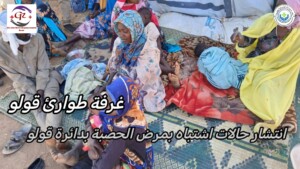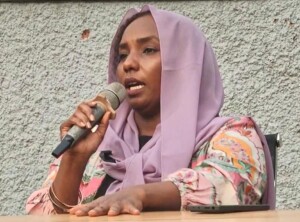Sudanese MoH and WHO launch health system development agreement
The Sudanese Ministry of Health, which met with the World Health Organization (WHO) yesterday to find ways to strengthen the country’s health system, announced the registration of 698 new cases of COVID-19 and 40 deaths from Wednesday to Friday.
 WHO worker visits North Darfur to monitor health services provision in the area (WHO)
WHO worker visits North Darfur to monitor health services provision in the area (WHO)
The Sudanese Ministry of Health, which met with the World Health Organization (WHO) yesterday to find ways to strengthen the country's health system, announced the registration of 698 new cases of COVID-19 and 40 deaths from Wednesday to Friday.
The General Directorate of Emergency and Epidemic Control said in its daily report that the total number of cases rose to 22,963, deaths 1,450, and 13,260 recoveries. The majority of cases were recorded in Khartoum, El Gezira, North Kordofan, Northern, River Nile, Red Sea, and El Gedaref states.
The Ministry of Health and the WHO launched an agreement to support the reconstruction and development of the health system in Sudan yesterday, as part of the project ‘Strengthening preparedness and response of the health system addressing the COVID-19 Pandemic in Sudan’ announced on June 24.
The large-scale 2-year project will benefit an estimated 42 million people in Sudan, including internally displaced people and refugees. The project is funded by the European Union Trust Fund and the Humanitarian Aid department of the European Commission.
The meeting focused on finding practical ways to attract resources and expertise, as well as providing support for a strategic and technical reform of the health system, and strengthening the delivery of the health system.
Ahmed El Mandhari, Regional Director of the WHO, stressed that Sudan is currently a priority of the organisation. He expressed that “during this meeting, the Ministry of Health and the WHO have become one team.”
COVID-19 response
Doctors in Sudan say that “the real number of cases is much larger” than the recorded cases.
The Imperial College London COVID-19 Response Team estimated that only two per cent of COVID-19 deaths have been reported in Khartoum. As a result of the lack of recording, the ICL estimates that around 16,090 deaths may have been missed as of November 20.
To halt the spread of the virus, the country’s ninth university closed its doors and work was suspended in various criminal and civil courts at the beginning of December. Meanwhile, Ministry of Education recommended that basic and secondary schools reopen, especially the eighth-grade of basic schools and the third-grade of secondary schools.
Last week, the Ministry of Health announced that 8.4 million doses of the COVID-19 vaccine will be provided to specified target groups. The distribution of the vaccine is planned to take place in the first quarter of 2021, depending on global production and waiting lists.
In a statement to the UN 13th General Assembly Emergency Session on Friday, acting Minister of Health Osama Abdelrahim expressed his gratitude to the UN and its agencies for “the great role” they played in supporting his ministry in the fight against the second COVID-19 wave.
Radio Dabanga’s editorial independence means that we can continue to provide factual updates about political developments to Sudanese and international actors, educate people about how to avoid outbreaks of infectious diseases, and provide a window to the world for those in all corners of Sudan. Support Radio Dabanga for as little as €2.50, the equivalent of a cup of coffee.












 and then
and then